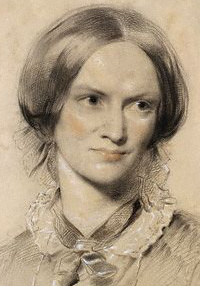Today is Charlotte Bronte‘s birthday (1816 – 1855).
Frye in Notebook 44 on Shirley:
[182] [Charlotte Brontë’s] Shirley: full of characters spouting ideologies, including naturally the author’s own. Toryism, radicalism, rationalized laissez faire, the sexist ideology Charlotte Bronte knew so much about; economic miseries of Orders in Council; the understandable but mistaken tactics of the Luddites, all dated back to 1812 from the 1840’s to provide the hindsight of the Chartist parallels. Other books studying these topics directly might have more & better organized information, but if written in ideological language, however detached or partisan, would have to treat all individuals as case histories. What makes Shirley & other works of fiction irreplaceable is the assimilation of all this to the primary concerns of food (i.e. jobs), sexual love, work & play.
[183] Hence the “vertical” or mythological tradition becomes relevant too. But just as most social criticism ignores everything really germane to the structure of the book, so most Wissenschaft criticism confines itself to clichés about Byron & Scott & the Gothic novel or whatever. That’s traditional crap, corresponding to Terry Eagleton’s Marxist crap: the oversimplified Toryism of Helstone & radicalism of Yorke are the prototypes of this in the novel itself. But novels are “tracts for the times” without hindsight or history.
[184] The allusiveness of literary works to each other is part of their structure, not an ornamental or display-on-a-mantelpiece or whatnot of erudition. Cultural tastes define individual, as distinct from generic character, and Caroline’s preference of Chenier to Racine is an individual trait of this kind. Similarly with the use of Coriolanus as an archetype of Moore. Readers are expected to pick up, say, a sentence (find it) that echoes both Psalm 23 and Hamlet (“prophetic soul”), or to understand why the phrase “I am not mad” should be referred to both St. Paul & Racine’s Berenice.
[185] With such powerful anti-sexist writing in the book, why didn’t it do more for “consciousness-raising” at the time? Because literature doesn’t work by magic: the reader is responsible for the moral quality of what he reads: the critic should be the avant-garde reader, so if it’s anyone’s job it’s his. But while Shirley was being written a venomous attack on JE [Jane Eyre] came out in the QR [Quarterly Review], written with a classbound smugness that these days has to be read to be believed.[ (Some of its phrases are incorporated in a later chapter of Shirley.) The writer has authority, all right, but the resistance to that authority is very powerful, & much of it takes the form of frivolous comments about lack of unity, unconvincing plot, & similar devices for dodging the critic’s one job: recognizing what’s there to the best of his ability.
[186] The primary literary allusions in Shirley are Biblical (including Bunyan), and they come to a climax in Shirley’s reconstructions of two Biblical myths. Eve, for Shirley, was not the insipid Eve, as she considered her, of Paradise Lost, but a Titaness-Eve, a Lilith-Eve almost. This theme is evoked in a chapter called ironically “The First Bluestocking,” which takes the Genesis 6:1-4 myth & develops it in a quite extraordinary way.
[187] There are also the plot-symmetries, starting with the very common Victorian convention of two heroines, one dominant and the other recessive. They’re not sisters, but they marry brothers. Caroline goes through a point of ritual death and recognizes her mother at the end of it: Robert Moore goes through a similar point and recognizes her. Critics shouldn’t waste time talking about whether these devices are “convincing” or not: they’re just talking about the way they’d have written the book.
[189] Shirley is a well known and highly respected novel, but it is not and probably never will be as popular as Jane Eyre. Popularity may have an ideological link, like Uncle Tom’s Cabin, but this is rarely primary: the usual reason for popularity is mythological, the unobscured revealing of archetypes. I’ve said this: I want to say it again because of the concern thesis. The Cinderella type of story dramatizes the victory of a sexual concern over a social establishment that has every appearance of being able to suppress it.
[190] Again on sources & influences: the “background” ones, like, for Shirley, the influence of Byron & Scott & Gothic fiction, are secondary because they’re seldom mentioned in the text in any significant way. Coriolanus, Chenier, the quoted ballads, & Shirley’s great Genesis fantasies are primary. Similarly in the ideological area: there’s the more purely social factor & the autobiographical ones (Charlotte’s special knowledge of the status of women, governesses, the clergy, reminiscences of Emily & Anne in the heroines, etc.) (CW 5, 140–2)

